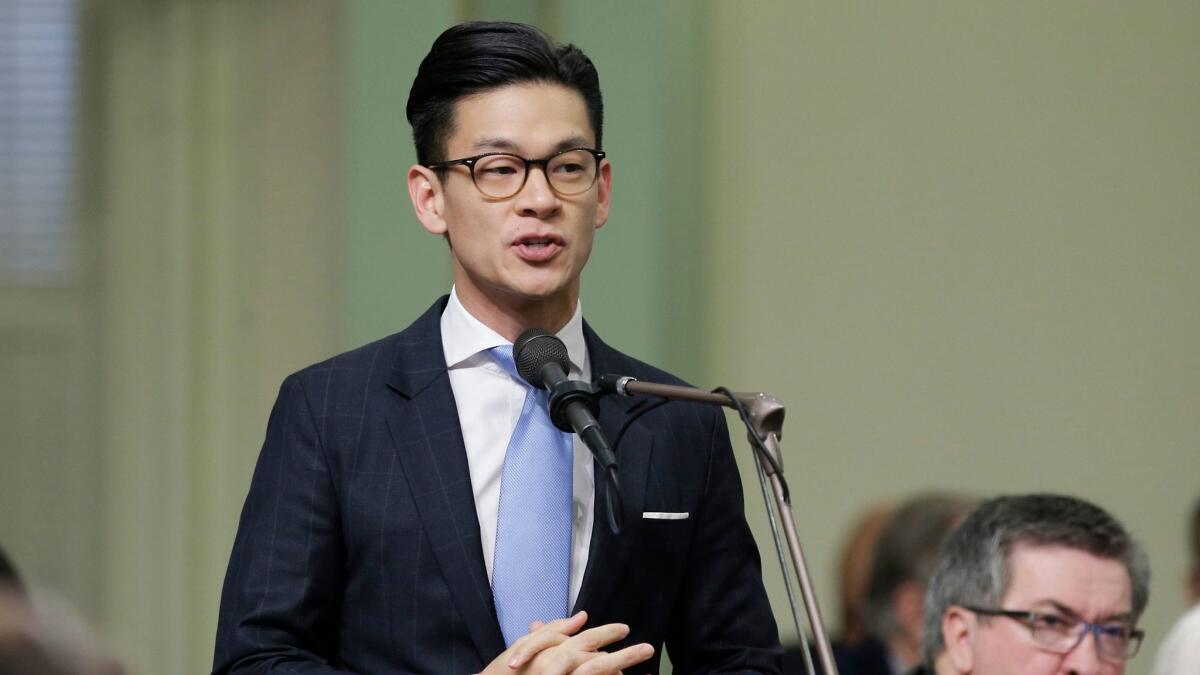Q&A: Meet the man driving the future of Uber and Lyft in the California Legislature

- Share via
Uber and Lyft have had lots of success getting friendly laws passed at the state Capitol. For that, they can thank young, tech-friendly Democratic lawmakers, who have teamed up with Republicans who generally support fewer regulations. At the head of that coalition is Assemblyman Evan Low (D-Campbell), who co-founded the Legislature’s tech and millennial caucuses.
The 34-year-old Low, who was elected in 2014, has also written legislation to make it easier for the taxi industry to compete with ride-hailing companies.
State regulators in recent years decided to oversee Uber and Lyft, allowing the companies to avoid the patchwork of local rules that taxis have to deal with. Low’s new legislation aims to regulate cabs regionally so that they also won’t need city-by-city permits.
The idea, Low said, is for the state to create a more level playing field and prepare for the impact future autonomous vehicles will have on how Californians travel. We spoke with Low about the role of the Legislature in shaping how Uber and Lyft, which are known formally as transportation network companies, or TNCs, operate. (The interview has been edited for length and clarity.)
You’ve written a number of bills that make it easier for ride-hailing companies to operate here. Why?
It's a win-win solution on all aspects of it. There's absolute convenience on the technology that exists to say, “If I’m trying to get from Point A to Point B and there might be another individual who needs to get from Point A to Point B and it's all on the same way, I'm going to save money by having to carpool with somebody.” But in addition, it's going to help on the environment and congestion. And the drivers will benefit.
Why are you also trying to help taxis out?
When I had the bill the previous year with respect to TNCs, the taxicabs were in opposition. They cried foul. They said, “This industry is being decimated, and we don't feel like it’s a fair playing field.” I was very sympathetic.
Under your bill, there's still going to be regulatory disparities between the taxi industry and Uber and Lyft, like fingerprint background checks. It's required in your bill for taxis. It’s not required for Uber and Lyft. Do you think Uber and Lyft drivers should be required to have fingerprint background checks as well?
You offer a very good point in that it outlines what I oftentimes talk about, sort of a Venn diagram: Within the legislative process, how do we get to a point where you bring stakeholders to the table to get something that is palatable that can pass through the Legislature to the governor's desk, and get the governor to sign?
Back to answering your question, I do support the necessary background checks for making sure that we have the safety of the consumer who uses these services.
Are the background checks that companies like Uber and Lyft do sufficient in your mind?
They’re sufficient enough for me to use TNCs. In other words, I personally feel safe going into a Lyft, an Uber.
And the reason you included fingerprint background checks for taxis is you felt it would neutralize some potential opposition to the bill?
If we hadn't included it, there would be significant opposition. I would rather start with small, incremental steps. If we address some of these other issues, then perhaps that's another conversation.
There are a lot of troubles going on at Uber right now. Do you think any of those problems they're having say anything about the larger industry?
I'd say that by default in the nature of a start-up, there are significant challenges and problems that exist. Significant corrective action is being taken by many of these companies. And frankly, when you see some of the other competitors in the TNC spaces, you see very much of a proactive approach, [a] very vocal approach to say we want to be good actors. Therefore, we're going to go above and beyond to demonstrate how much we're good actors because we want to look like a shining angel in comparison to some of our competitors.
But certainly sexual harassment is not “by default” involved in start-ups, right?
Tech is very broad. There have been significant highlighted problems within specific companies within the tech world. But I'd say the vast majority, in my experience and observation, are good actors.
Autonomous vehicles are regulated primarily by the Department of Motor Vehicles, Uber and Lyft are regulated by the Public Utilities Commission and taxis are regulated by cities. Is the state set up to address the changes that are going on in this industry?
I don't think we are today. Clearly you just outlined various modes of transportation with varying regulatory agencies overseeing them. I do think it's an appropriate time to engage in a wider conversation about the vision of California in the transportation space. We are very much engaged in that conversation. But we are also guilty of being slow at that process and not keeping up to date with that.
What's the role of the Legislature in addressing that?
Previously, I would have articulated that the Legislature was reactive to it. But there is a great appetite for members of the Legislature to engage in proactive conversations about the regulatory, the oversight and the legislative process to it.
ALSO
Uber and Lyft are winning at the state Capitol — here's why




